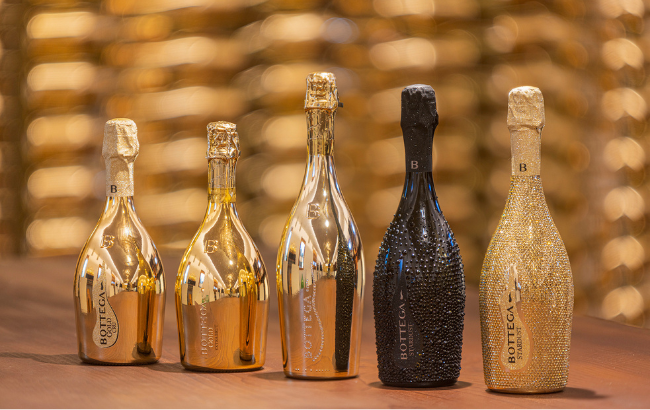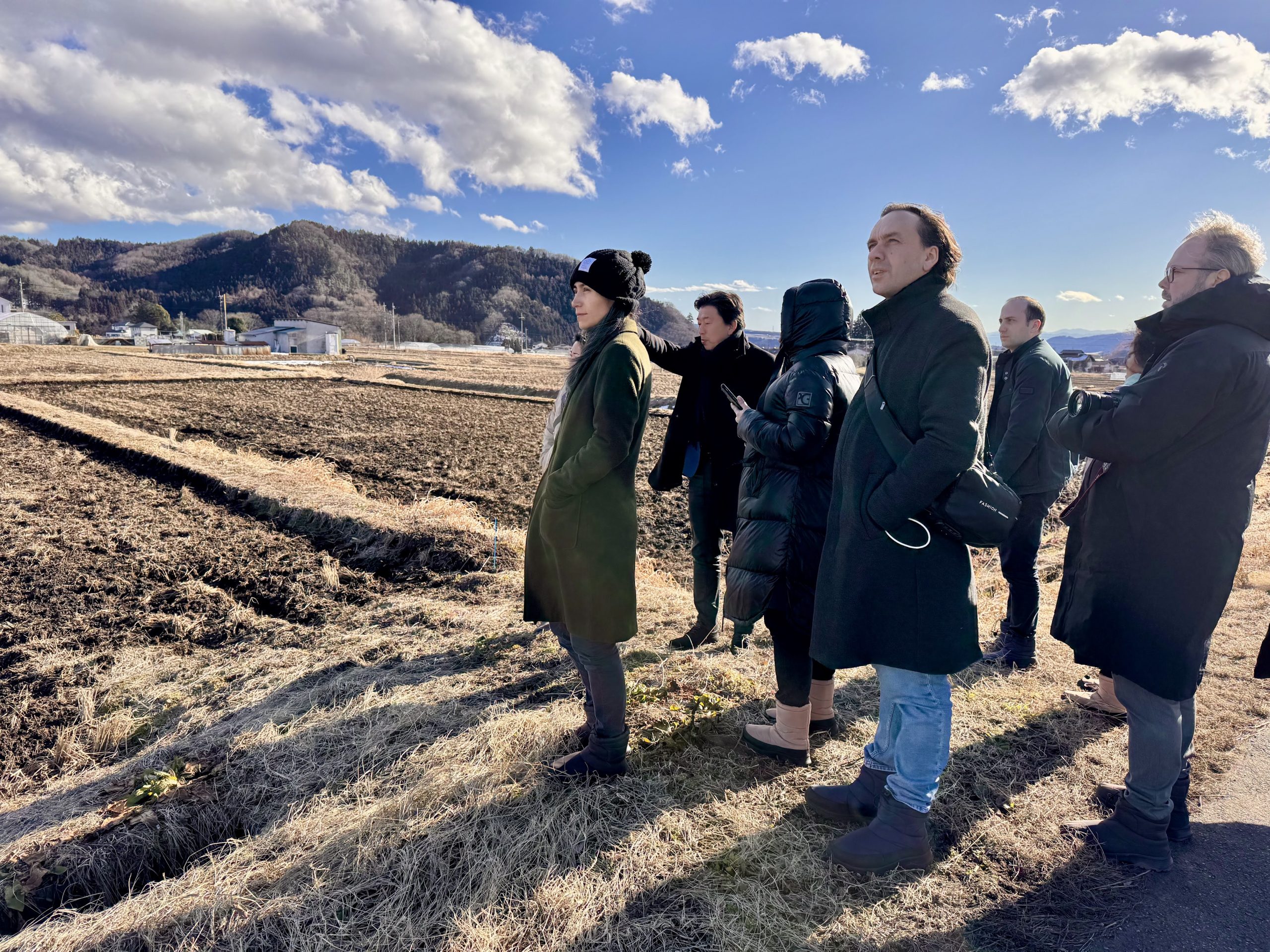In focus: How eco-conscious drinks brands are creating sustainable sips
By Elizabeth GregoryEvery year, 1.3bn tonnes of food around the world is wasted. In the UK alone this figure stands at 4.5m tonnes, with 100 million pints of milk reportedly tipped down the drain each year.
A growing number of drinks brands are building their businesses around the need to tackle the problem of food waste. Whether it’s by using delicious but wonky fruit to infuse water, making beer out of surplus bread, or vodka out of whey, we’ve profiled 10 sustainably-minded drinks brands that are turning edible trash into liquid treasures.
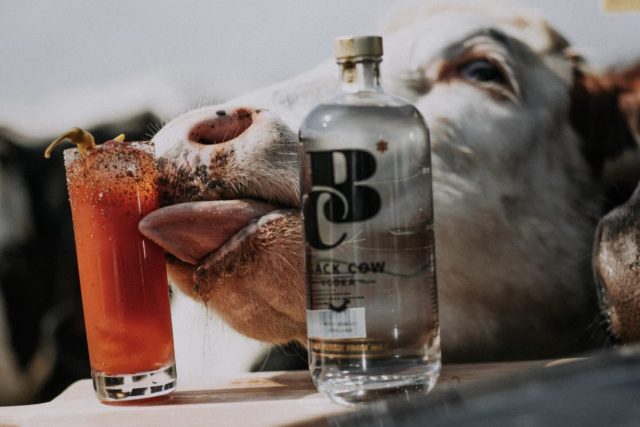
Imagine you’re in a kitchen surrounded by the rolling green hills of West Dorset, having a drink of homemade cider with your old friend and neighbour. A colleague who is with you samples the rustic beverage and then gestures to the field outside, down the garden and over the wire fence where your friend’s 250 cows are grazing, and says: Do you know you can make amazing drink from milk?
This was the lightbulb moment for farmer Jason Barber and artist Paul Archard, the duo behind Black Cow, the world’s first pure milk vodka made from whey. About a year-and-a-half later, in 2012, the first Black Cow bottle was sold.
“What was so attractive about it was the idea of using up this waste that’s leftover from the cheese production,” says Archard. Typically people would use whey to feed their pigs, or it would go into food processing. “But it’s a wonderful material, I mean, just as wonderful as the other half of the milk – the curds. So we wanted to do something really great with it.”
The brand is built on tradition: Barber’s family are one of the oldest, if not the oldest, continuous Cheddar-making families in the country and have been milking cows for at least 300 years around the Somerset and Dorset area. The process also harks back to Genghis Khan, who drank a fermented beverage made of milk. Returning to these roots, Black Cow’s latest export has been to Kazakhstan, after a direct descendent of Genghis Khan contacted the brand asking to import it. On MIAT Mongolian Airlines they are the vodka that is sold in miniatures.
The vodka is currently available across much of Europe, in America both on the East and West Coast, and in major high-end UK stores such as Harvey Nichols, Majestic, Waitrose and Selfridges. The brand’s three products are also available to purchase online: the classic Black Cow Vodka, the Black Cow Negroni – made with an Italian Campari and Spanish Vermouth as an ode to Europe and British Summer Time, and Black Cow and English strawberries, using wonky unwanted strawberries that would have otherwise gone to waste to infuse the vodka.
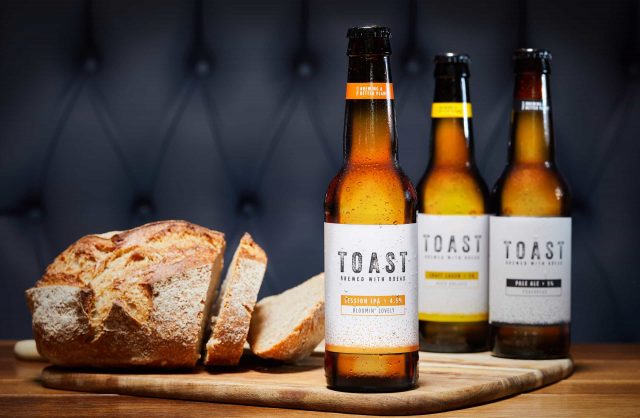
In January 2016 there was a meeting of minds between waste-campaigner and author Tristram Stuart and someone at The Brussels Beer project, a Belgian brewery who had created a beer called Baby Lone, harking back to the Babylonian method of using bread to make an alcoholic fermented brew. Realising that this would be a brilliant way to reduce food waste, the idea for Toast Ale began.
Working with baker partners bread is first dried and then is used to replace about a third of the barley usually used to brew beer. Although the Toast team has an in-house brewer who looks after recipes and quality control it outsources the production of the beer. The idea is that there is “slack” in the system – equipment that is not being used everyday and by filling this gap they are minisming their footprint.
Every inch of the company is built around charitable giving, and waste reduction. Since its January 2016 launch the company has saved over two million slices of bread from being thrown away, has donated nearly £50,000 to charity, has avoided 42 tons of emissions, saved 250,000L of water and reclaimed 170,000 m2 of land. Toast has won 11 industry awards for its efforts.
“Ultimately, we’re coming from the perspective of being environmentalists wanting to change the world and using the medium of beer to do that,” says COO Louisa Ziane, who worked with the Carbon Trust as a climate change consultant before working on Toast Ale.
Stocked around the country at nearly 600 stores including Waitrose, Co-op and Ocado, Toast Ale has a principle against exporting because of the carbon footprint it creates, so instead it partners with breweries around the world to produce beer with them, passing on its techniques.
During the first lockdown Toast Ale lost 65% of its revenue overnight, but used the opportunity to help others. In setting up their online shop the company added a giving option which would fund a meal and through this venture managed to fund 46,000 meals. Toast Ale also gives all of its distributable profits to charities in place of giving dividends to shareholders. It has just launched a new beer in collaboration with Oddbox and Flawsome drinks with profits going to Feedback, a charity co-founded by Stuart which is focused on building a better food system.
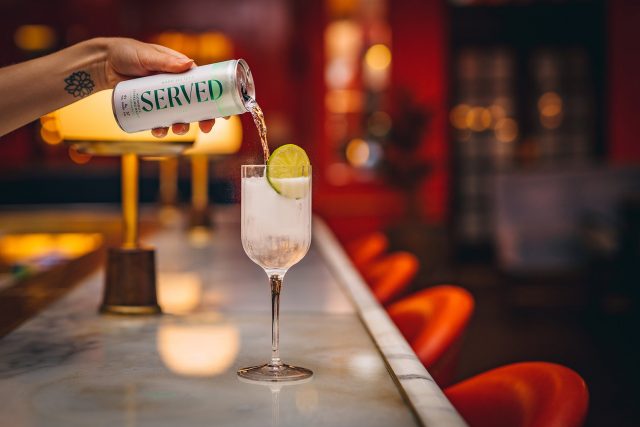
The idea for Served began in 2017 when two health-conscious restaurateur brothers, Dean and Ryan Ginsberg, saw a gap in the market as their customers were increasingly looking for a high-quality alcoholic beverage to match their healthy lifestyles, which had transparency, both in provenance and nutrition. The hard seltzer trend was growing in the US, but the brothers weren’t very impressed by the artificial flavourings.
“Hard seltzers play into a lot of those mega trends that are going on, whether it be sustainability, plant based products, reduced sugar, provenance, all of these sort of factors combined is what got us really excited about the category, which we hadn’t seen in the UK before,” says co-founder Dean Ginsberg.
The brothers decided to pursue sustainability in their production by using wonky fruit sourced directly from farmers that would have otherwise been discarded. Their cans are BPA free and 100% recyclable and Served drinks are produced on their site in Herefordshire. Served is working towards becoming carbon negative, and becoming a fully circular brand and supply chain. As part of this, the company pledges 5% of profits to environmental projects.
“We’re very passionate about wildlife, and in particular endangered wildlife,” says Ginsberg who is originally from South Africa and cites his background as part of the inspiration for his environmentalism. “When you run a business, you’ve got a responsibility to do your bit for the environment and the planet as a whole. It’s something we’re super passionate about as people. So we will be spending more time as the business grows, investing into environmental projects.”
Launching into Selfridges in July 2020 and now also stocked at Planet Organic, Served is launching into Harvey Nichols next month, and WHSmith in June. The Served drinks have four per cent alcohol, 0g sugar and 57 calories.
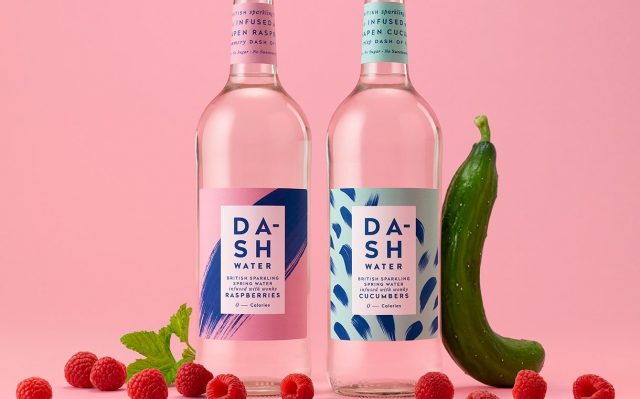
Launched in 2017, sparkling water company Dash Water began after friends Alex Wright and Jack Scott, both from farming backgrounds, wanted to do something about the waste they were seeing. 40% of fruits and vegetables grown in the UK go to waste.
They partnered with Feedback, a charity which is focused on reducing food waste, and connects farmers with excess supply to people who want it. To date, they have managed to save 547,000 kg of fruit and vegetables from going to waste. In 2021 they aim to save over 300 tonnes of surplus fruit and vegetables and by 2025, their ambition is to save 2500 tonnes.
Made from British spring water, wonky fruit and bubbles, Dash Water has no calories, no sugar, and no sweeteners. The products are served in aluminum cans and glass bottles “Making our cans from recycled aluminium uses a tiny 8% of the energy of producing new materials,” Wright explains.
On 16 March the company launched Dash Soda Water, with flavours rhubarb and fiery ginger, bitter orange and grapefruit, and lime and mint. The sparkling water, which comes in lemon, cucumber, peach and raspberry flavours is stocked across the UK at stores including Sainsbury’s, Waitrose, Planet Organic, Whole Foods, Boots and Selfridges.
ew3
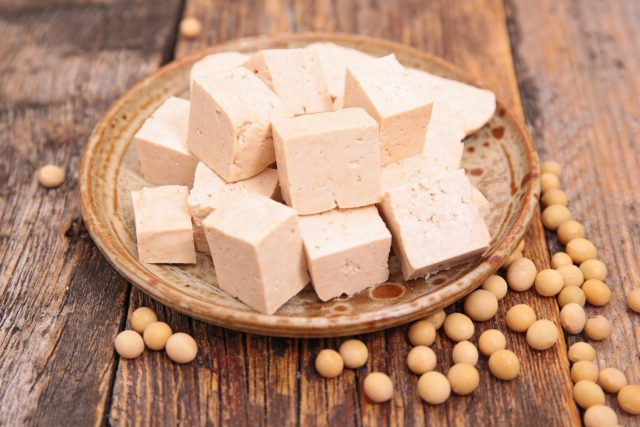
In 2017, Singaporian scientists at SinFooTech, a food technology company aiming to promote a resource-efficient, circular economy in the food manufacturing system, created Sachi, playing on the word sake, a soy-based alcoholic beverage that has been brewed from soy (tofu) whey. According to New Food magazine soy whey “is often disposed of via the sewage system, which can result in water pollution.”
Partner Content
The process began in 2016 when SinFooTech’s co-founder, Jian Yong, set out to conduct research into soy whey as part of his PhD studies at the National University of Singapore’s Food Science and Technology programme. After several months of trials the university team perfected a technique of turning soy into an alcoholic beverage.
The product has not yet been mass-marketed, but the company SinFooTech was created as a result of the overwhelming response to Sachi, with the aim of commercialising the drink and its patented fermentation technology. The company has plans for expansion into fruit flavoured versions of Sachi and is looking to create a non-alcoholic version. Sachi has 7% ABV, and has a “fruity and floral, sake-like flavour profile that is achieved without the use of any flavour additives.” It is also rich in soy antioxidants, and is gluten-free.
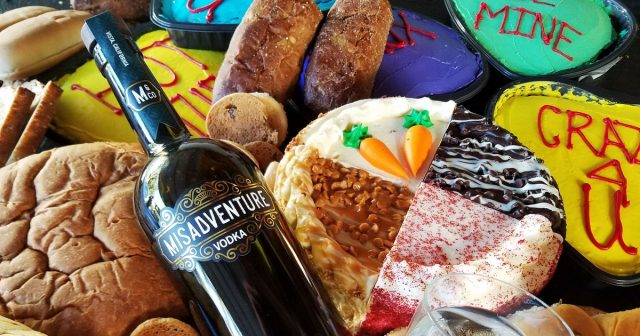
‘Hedonistic sustainability’ is the catchphrase of Misadventure & Co, and one which is easy to get behind. The company uses baked goods to make vodka, converting the starch from the discarded products into alcohol. Since 2018 the company has received 15 rewards, and was rated 94 points on the Ultimate Beverage Challenge 2018.
The San Diego-based company started after another chance meeting, when bartender Whit Rigali and agricultural economist Samuel Chereskin met in a bar and began talking about wanting to find ways to improve food systems while showing that doing good could also be viable. After four years of research and development in a cramped garage, and learning lessons with the San Diego brewing and distilling communities, they produced their first vodka.
According to Misadventure & Co, “Every year American consumers, companies, and farmers spend $218bn, or 1.3% of US GDP, growing, transporting, and disposing of 50-60m tonnes of food that never gets eaten.”
The company is carbon-negative and has sustainability at its core. “This vodka is not ‘greener’, it is green,” they say. “The business’ entire reason for existing is to make sustainability easy for the consumer.” Misadventure Vodka is currently only available in Orange County and the San Diego area.
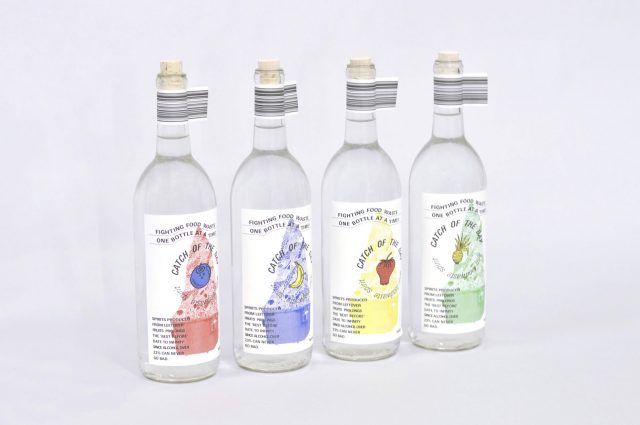
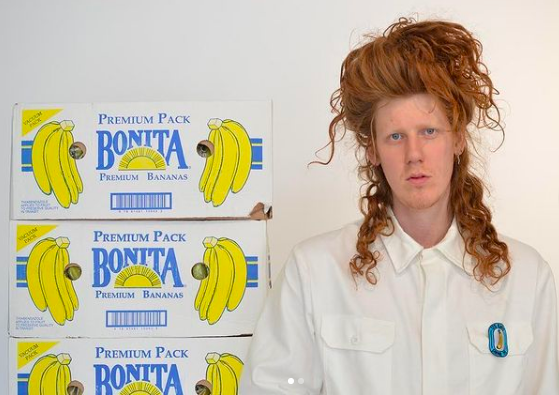
In 2018 Catch of the Day began when Reykjavík-based product designer Björn Steinar began producing alcohol from his dumpster-diving finds. In an effort to reduce waste through innovative means, Steinar designed his own simple open-source distilling machine, the details of which he then put on his website so others could also start distilling waste products.
After sourcing the abandoned fruits Steinar cleans and then juices them, before adding yeast to ferment the juice. Following fermentation the drink is distilled to alcohol which is then diluted to a 40% alcoholic drink. The vodka that is produced will have a faint hint of the fruit used to make it – some are slightly apple flavoured for example, others might taste of grape.
According to Garage magazine, Steinar has been working with local distillers and local food importers to increase the scope of Catch of the Day, turning it into a product that works on a commercial scale.
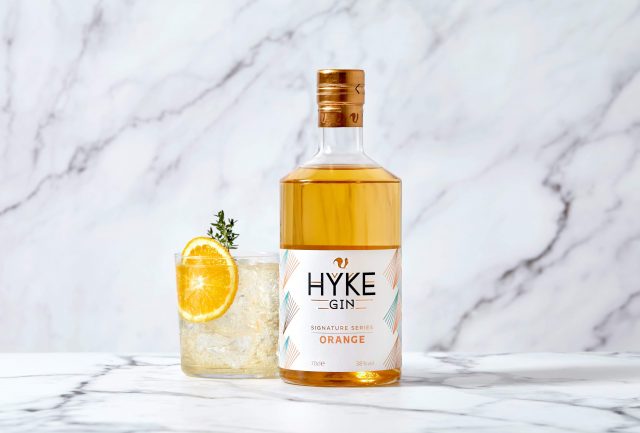
The idea for Foxhole Spirits arose from a conversation between co-founder James Oag-Cooper and Sam Linter of Bolney Estate during the 2013 English wine harvest after pondering over what could be done with the surplus grape material. Foxhole Spirits was launched three years later, following significant recipe developments and experiments with the process. Foxhole Gin is distilled from reclaimed English-grown grape-skins.
Based in Sussex, the company is focused on sustainability and aims to create a circular economy. “We can’t change the world; and we’re not trying to,” the site says. “It’s minds and perceptions we’re after.” In 2019 Foxhole Spirits launched HYKE Gin, the brand’s second foray into zero-waste produce, working with fruit importer Richard Hochfeld Ltd to use grape surplus to create a grape spirit which is used alongside grain spirit to produce the gin. In its first two years HYKE Gin kept more than 5.2 million grapes out of landfill. In 2020 the company launched Mad City Botanical Rum made from molasses, the natural by-product from processing sugar-cane.
Foxhole Spirits can be found in many of the UK’s biggest stores: Tesco, Waitrose and M&S, and is also on sale at Fortnum & Masons and Amazon, as well as others bars, restaurants and selected stores across the country.
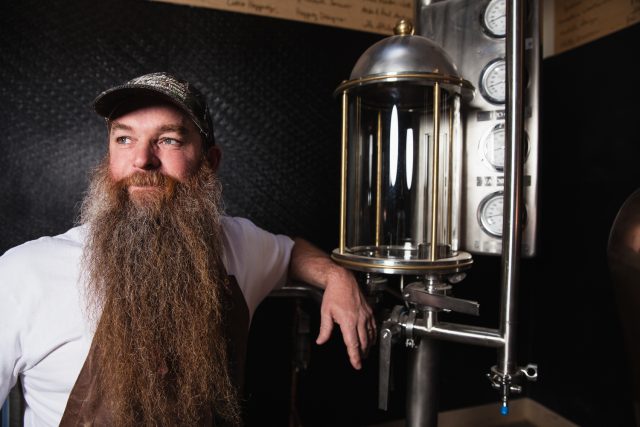
Amy and Steve Bohner have run Alchemy Construction in Humboldt County, California, for over 20 years. According to Humboldt Insider they are fixtures in their local community – frequenting baseball games and rock shows. The duo were already known for their environmentalism when they began Alchemy Distillery in 2010 as an idea to make high-quality grain-to-bottle spirits.
After years of training, workshops, learning how to build a distillery, develop a recipe and run a still, Alchemy Distillery made its first batch of 100% local wheat whiskey in December 2015. In June 2018 the pair debuted their first aged whiskey. This was an 100% local wheat whiskey that sold out in less than two hours. Since then they have produced a straight rye, a straight triticale whiskey and a straight Bourbon.
The company has sustainability at its core, sourcing grains locally and using American-made distilling equipment. It produces zero-waste during the distilling process and has a 3,000 gallon water recovery/chiller tank that recirculates their water. Perhaps their most well-know batch was a collaboration with Los Bagels, an Arcata based bakery, to produce a whiskey with old bagels. 100% of the spent mash from the process went to local pigs and it was reported that Amy Bohner had to use a wood chipper to break down the bagels.
The Los Bagels batch sold out in December 2019 – the next round will be available in 2022. Alchemy Distillery remains the first and only Humboldt distillery to make whiskey from local organic grains. The spirits are currently only available in California and Oregon.
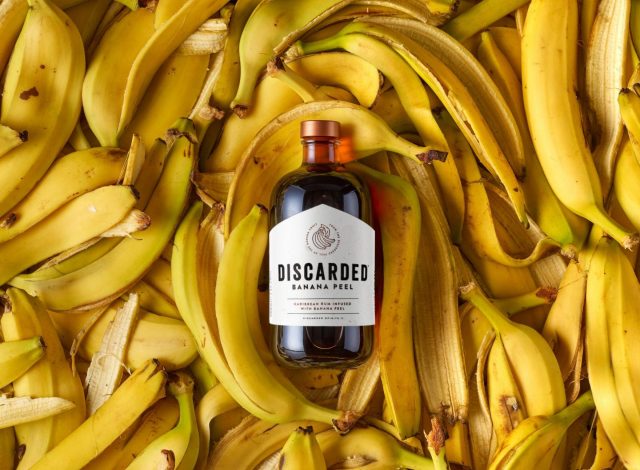
Discarded Spirits Co., a sustainable line from William Grants & Sons, launched in 2018. The company produces a Cascara Vermouth from the fruit that is discarded during the coffee production process, and a Banana Peel Rum, using ‘finishing’ rum, which is usually thrown away after flavouring whisky barrels, with banana peels for extra flavour.
The company’s sustainability efforts don’t stop there. When the on-trade opened up for outdoor dining on 12 April, Discarded sent out a team of ‘zero-waste-warriors’ to help keep London’s Soho streets clean with the aim to recycle all litter to make face masks for bar staff. Last July the company used the excess by-product of milk to make hundreds of renewable facemasks for bartenders working across the country.
The range is available in bars including The Groucho Club, Petersham Nurseries and The Cavendish. Discarded’s Cascara Vermouth is usually available at Waitrose.



